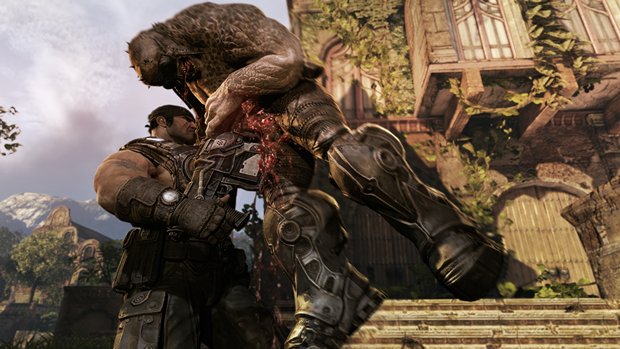Last updated on April 10, 2015
36 “Teacher, which is the great commandment in the Law?” 37 And He said to him, “‘You shall love the Lord your God with all your heart, and with all your soul, and with all your mind.’ 38 This is the great and [a]foremost commandment. 39 The second is like it, ‘You shall love your neighbor as yourself.’ 40 On these two commandments depend the whole Law and the Prophets.”
Matthew 22:36-40
If there’s one thing I made unerringly clear during my time at Theology Gaming, I think a love of dumb things and explosions emerges first and foremost. Video games, especially, can create bizarre, completely unrealistic circumstances that require an equally absurd solution. The people who make those sorts of mechanically-intense games with unorthodox settings that scream “campy” delight me to no end, and you rarely see that in other forms of entertainment media.
Maybe that’s because I grew up with the stuff. Most video games contained strangely abstracted version of hyperrealites, strange worlds where things didn’t always quite fit in the way the designers intended. Why did Mario jump on possessed, evil mushrooms, just for example? Why does my weird demon-hunter guy like wielding duel pistols and a sword? Isn’t that cool, but also hilariously efficient? I never found the need for video games to become “realistic” or “meaningful” because mechanical interactions provide that meaning to the player. Challenge and craziness sit hand in hand. Rising to the challenge transforms into a narrative all its own, even if nothing makes sense.

And, I guess, that also explains why I like Gears of War a whole lot. Having played the first two games both single-player and in co-operative mode, I can say those two games are pretty much a shining beacon of crystal-clear focus in game design, as well as just the whole feel of the games. I guess playing Gears 3 on Easter with family reminded me of this.
The core mechanics of Gears are very solid and very fun. What makes them fun is their unerringly linear design – they don’t let you move and travel to strange places. The plot moves you on a roller coaster track, and throws you through all sorts of drops and loops. Every design decision and set piece is clear and purposeful, and Gears is unlike many such games in that it rarely wrests controls from your hand with the exception of cutscenes (the first game does the “walk while moving slowly” thing, which they basically stop doing after the first game). It’s just got darn tootin’ good level design, and it rarely wastes your time with weird extraneous details. It doesn’t hurt that every action feels pretty darn good, especially chainsawing things in half with the Lancer or curb-stomping. Melee is useful and often a nice punctuation to a long firefight.
Gears’ campaign combat is quite solid enough that I don’t mind playing it a lot. I suppose any cooperative game fits into this vein, but rarely are they such wonderful “pick up and play affairs”. It’s not really a game about strategy: it is a game about wall-to-wall action setpieces with a well-crafted “stop-and-pop” system which uses its levels to emphasize cover placement and headshots. The way they arrange said cover continues to make things interesting, and throwing enemies that require different approaches on top of it lets them layer a variety of different challenges in any one scenario. Aerial enemies, melee focused enemies, exploding enemies – all of them force you to use cover in slightly different ways that are intended to throw you off balance just enough. All of this becomes very, very important as the difficulty setting ratchets up. I remember the boss at the end of Gears 2, and boy is that one a treat as it attacks you from multiple angles. Most bosses do that by removing your safety net in some way, forcing you to adjust on the fly.

The train in Gears 1 forces the player to implement all they learned about the cover system. The ice storm sequence in Gears 2 teaches players to expect attacks from different angle, wrangling with the timing of the icicles alongside fighting enemies. These are unbelievably sterling examples where so many game elements all mesh and use the cover system brilliantly. It is focused and taut beyond belief. Even though it does present many similar situations, it is in the nuances and pacing where Gears excels. It’s rare that a game knows exactly what it is, what choices to make, and what surprises to throw at a player, and it’s a testament to Gears that so many games copied its formula thereafter with mixed success No doubt, Gears set a standard for third person shooter campaigns and single-player experiences, and that influence continues to the modern day. I don’t think it’s any coincidence that Gears came out precisely one year or so before Call of Duty: Modern Warfare – the trends continue in the AAA game market.
Gears’ combat is never not exciting unless you decide to take yourself out of the moment. Now, whether or not you like those setpieces is clearly a matter of personal opinion, but “feeling” they are boring does not make them boring. Gears, and games like it, ARE shooting galleries. It is a next-gen version of Space Invaders, and that’s partly what makes it great. Gears makes you shoot stuff for hours, and all Epic Games did was enhance the visceral nature of that shooting. It’s just subtle enhancements here and there; take any map in the game, and it’ll look like you took a trip back to 1978 (it’s also why I am surprised that a game like it, in the 2000s ended up so successful). You point at things, you shoot, you take cover – every elements about it is immediately accessible, and is part of its success.
If you don’t like the core action loop, then you’re just not going to like it very much in the long run. And, I guess, if you don’t like the travails and plot wranglings of science fiction meatheads who weight hundreds of pounds and slam themselves so hard into concrete walls they make the screen shake, then Gears won’t work for you. This is an action movie in the Michael Bay lane with hints of emotional resonance, and that appeals to a wide audience which begged for such fun in their games decades ago. In short, Gears of War wants to provide players with “fun”, and that’s exactly why it exists. On one level, it’s a well-crafted game. On the other, it is stupid, dumb fun refined into an art form.
I guess Gears remains one of those places where my intellectual and base instincts collide into fun. There is a delight in liking dumb things that I will attempt to describe…
